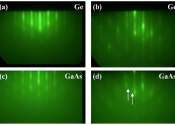EU, Germany reach deal on fossil fuel car phaseout plan
The European Union and Germany on Saturday said they had struck a deal after a dispute over the planned phaseout by 2035 of the sale of cars using fossil fuels.
Mar 25, 2023
2
32
Energy & Green Tech

The European Union and Germany on Saturday said they had struck a deal after a dispute over the planned phaseout by 2035 of the sale of cars using fossil fuels.
Mar 25, 2023
2
32
Robotics

One of many special human qualities is the ability to handle objects with skill and precision. This is all down to our sense of touch, which is particularly acute in the tips of our fingers. Using our hands, we are able to ...
May 3, 2022
0
104
Security

Artificial intelligence (AI) tools such as ChatGPT can be tricked into producing malicious code, which could be used to launch cyber attacks, according to research from the University of Sheffield.
Oct 24, 2023
0
46
Engineering

The time-honored Edisonian trial-and-error process of discovery is slow and labor-intensive. This hampers the development of urgently needed new technologies for clean energy and environmental sustainability, as well as for ...
May 15, 2023
0
154
Energy & Green Tech

Alternative-energy research at Oregon State University is charting a path toward the mass adoption of clean cars powered by direct-ethanol fuel cells.
Nov 29, 2021
1
436
Electronics & Semiconductors

Researchers with the University of Chicago Pritzker School of Molecular Engineering have shown for the first time how to design the basic elements needed for logic operations using a kind of material called a liquid crystal—paving ...
Mar 2, 2022
0
480
Electronics & Semiconductors

Electronics engineers worldwide are trying to improve the performance of devices, while also lowering their power consumption. Tunnel field-effect transistors (TFETs), an experimental class of transistors with a unique switching ...
Engineering

The public's appetite for inexpensive and powerful electronic devices continues to grow. While silicon-based semiconductors have been key to satiating this demand, a superior alternative could be wide-bandgap semiconductors. ...
May 23, 2024
0
44
Engineering

Carnegie Mellon mechanical engineering researchers have developed a new scalable and reproducible manufacturing technique that could accelerate the mainstream adoption and commercialization of soft and stretchable electronics.
Aug 30, 2022
0
79
Engineering

Researchers have developed a hackable and multi-functional 3D printer for soft materials that is affordable and open design. The technology has the potential to unlock further innovation in diverse fields, such as tissue ...
Oct 27, 2022
0
116
An engine is a mechanical device that produces some form of output from a given input. An engine whose purpose is to produce kinetic energy output from a fuel source is called a prime mover; alternatively, a motor is a device which produces kinetic energy from other forms of energy (such as electricity, a flow of hydraulic fluid or compressed air). A motor car (automobile) has a starter motor and motors to drive pumps (fuel, power steering, etc) – but the power plant that propels the car is called an engine. The term 'motor' was originally used to distinguish the new internal combustion engine -powered vehicles from earlier vehicles powered by a steam engine (as in steam roller and motor roller).
Military engines included siege engines, large catapults, trebuchets and battering rams.
This text uses material from Wikipedia, licensed under CC BY-SA